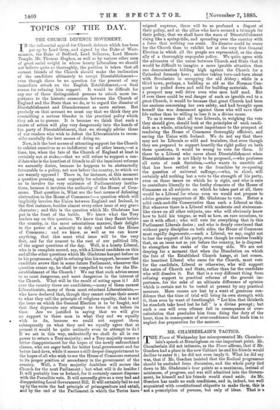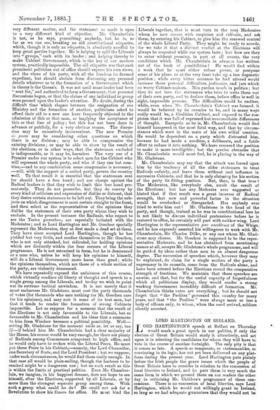MR. CHAMBERLAIN'S TACTICS.
THE Times of Wednesday has misrepresented Mr. Chamber- lain's speech at Birmingham on one important point. Mr. Chamberlain did not intimate, as the Times affirms, that if Mr. Goschen had a place in the new Cabinet he and his friends would decline to enter it ; he did not even imply it. What he did say was, that if Mr. Goschen insisted that the Radical programme should be excluded from discussion, and the whole party tied down to Mr. Gladstone's four points as a maximum, instead of minimum, of progress, and was still admitted into the Govern- ment, he himself and his friends would stand aside. As Mr. Goschen has made no such conditions, and is, indeed, too well acquainted with constitutional etiquette to make them, this is not a proscription of persons, but only of ideas. That is a very different matter, and the statement so made is open to a very different kind of objection. Mr. Chamberlain is not, as he says, proscribing anybody, but he is, so far as we can see, breaking an old constitutional etiquette, which, though it is only an etiquette, is absolutely needful to keep great parties together. He is helping to split the Liberals into " groups," each with its leader ; and helping thereby to make Cabinet Government, which is the key of our modern system, practically impossible. The old etiquette was that each prominent politician out of office should express his own views, and the views of his party, with all the freedom he deemed expedient, but should abstain from discussing any personal details whatever as to the formation of a Government which in theory is the Queen's. It was not until some leader had been " sent for," and authorised to form a Government, that personal discussions began, or that the claims of any individual or group were pressed upon the leader's attention. No doubt, during the difficult time which elapses between the resignation of one Ministry and the formation of another, politicians asked to afford their aid to a new one have frequently objected to the admission of this or that man, as implying the acceptance of this or that line of policy ; but this has not been done in advance or publicly, for a very obvious reason. The discus- sion may be excessively inconvenient. The new Premier in posse may be considering other questions on which there is no division ; may be able to compromise the existing divisions ; or may be able to show by the result of the elections, or in other ways, that the statesman excluded is indispensable, or it may be, harmless. The very use of a Premier under our system is to select men for the Cabinet who will represent the whole party, and who if they can but com- bine,—and to any combination some compromise is necessary, —will, with the support of a united party, govern the country well. To that result it is essential that the statesman sent for should have a free hand ; and our charge against the Radical leaders is that they wish to limit this free hand pre- maturely. They do not proscribe, but they do convey by every kind of criticism and expression of dislike or distrust, that they desire certain statesmen to be left out. They bring the sub- jects on which disagreement is most certain straight to the front, and then select as the representatives of the opinions they dislike the statesmen of their own party whom they wish to exclude. In the present instance the Radicals, who expect to see the Tories powerless, are especially irritated with the Moderates ; and as Lord Harlington and Mr. Goschen specially represent the Moderates, they at first made a dead set at them. They have since accepted Lord Harlington, though he has yielded but very little, and confine themselves to Mr. Goschen, who is not only attacked, but ridiculed, for holding opinions which are distinctly within the four corners of the Liberal programme. He is not ostracised in form, but he is denounced as a man who, unless he will keep his opinions to himself, will do a Liberal Government more harm than good ; while the opinions themselves, which are those of a whole section of the party, are violently denounced.
We have repeatedly exposed the unfairness of this course, which virtually confines all liberty of thought and speech to a single group among the Liberals, and to-day we wish to point out its extreme tactical unwisdom. It is not merely that it must embarrass Mr. Gladstone, must cost the party thousands of votes (for thousands who care nothing for Mr. Goschen care for his opinions), and may cost it some of its best men, but that it tends to render the formation of strong Cabinets impossible. Let us suppose for a moment that the result of the Elections is not only favourable to the Liberals, but so favourable to Mr. Chamberlain and his ideas that a summons to him from Windsor becomes a political possibility. Well— setting Mr. Gladstone for the moment aside as, let us say, too ill—if behind him Mr. Chamberlain had a clear majority of the House, his course would be easy enough, for there are plenty of Radicals among Commoners competent to high office, and he would only have to reckon with the Liberal Peers. He must put three Peers in his Cabinet,—namely, the Lord Chancellor, one Secretary of State, and the Lord President ; but we suppose, under such circumstances, he would find them easily enough. In that case all` would be plain-sailing, though the harbour to be reached might be a dangerous one ; but no such result as this is within the limits of practical politics. Even Mr. Chamber- lain, we imagine, in his happiest dreams, does not hope to see himself, after the Elections, supported by all Liberals, or by
more than the strongest separate group among them. With such a group what could he do I He could not ask for a Revolution to show his fitness for office. He must bind the
Liberals together, that is must turn to the very Moderates whom he now covers with suspicion and ridicule, and ask them, by entering his Cabinet, to give him the renewed control of the whole Liberal Party. They might be ready to accede, for we take it that a distinct verdict at the Elections will always be respected while our system lasts ; but how are they to enter without pressing, in part at all events, the very conditions which Mr. Chamberlain in advance has written out of the book of possibilities ? He would find within a week that he must either refuse power, or postpone some of his plans, or at the very least take up a less dogmatic position ; while every bitter sentence he had uttered would increase those personal difficulties, jealousies, and jars which so worry Cabinet-makers. Men pardon much in politics ; but they do not love the statesman who tries to write them out of their own party, and to declare them, before office is well in sight, impossible persons. The difficulties would be endless, while, even when Mr. Chamberlain's Cabinet was formed, it would be believed by its enemies to be, and in many ways really would be, a Coalition Cabinet, and exposed to the sus- picion that it was full of repressed but irreconcilable differences of thought. Energetic as he is, Mr. Chamberlain would find himself hampered in the most fatal way, and that by circum- stances which were in the main of his own wilful creation. He would be dependent on a party which distrusted him, because he had made a needless, a deliberate, and a futile effort to reduce it into nothing. We have reversed the position to make it more intelligible ; but the precise obstacles that Mr. Chamberlain would most feel, he is placing in the way of Mr. Gladstone.
Mr. Chamberlain may say that the attack was forced upon him by the tendency of all the older statesmen to treat Radicals unfairly, and leave them. without real influence in successive Cabinets, and that he is only claiming for his section of the party its fitting position. But, then, is that true ? The Moderates, like everybody else, await - the result of the Elections ; but has any Moderate ever suggested or hinted that if that result was a great increase of Radical strength, that new and powerful factor in the situation would be overlooked or disregarded. Rae anybody ever tried to write him out ? Mr. Gladstone is the head of the party, and though, trained as he was in constitutional lore he is not likely to discuss individual pretensions before he is restored to office, he certainly will part with neither wing. Lord Hartington is the representative par excellence of the Whigs, and he has expressly asserted his willingness to work with Mr. Chamberlain, Sir Charles Dilke, or any one whom Mr. Glad- stone may choose. Mr. Goschen is supposed to be the repre- sentative Moderate, and he has abstained from mentioning names at all, accepts Mr. Gladstone's whole programme, and will be guided by ideas rather than men to an almost dangerous degree. The succession of speeches which, however they may be explained, do claim for a single section of the party a
supremacy in its councils, come from the Radicals alone, and have been uttered before the Elections reveal the comparative strength of fractions. We maintain that those speeches are unwise, and that, but for the useful capacity of forgetfulness which all politicians display, they would render a strong working Government incredibly difficult of formation. Mr.
Chamberlain thinks votes are everything ; but he should not forget that "the Peelites " governed this country for many years, and that " the Peelites " were always more or less a body of officers only, to whom, when the need arrived, soldiers silently accreted.















































 Previous page
Previous page